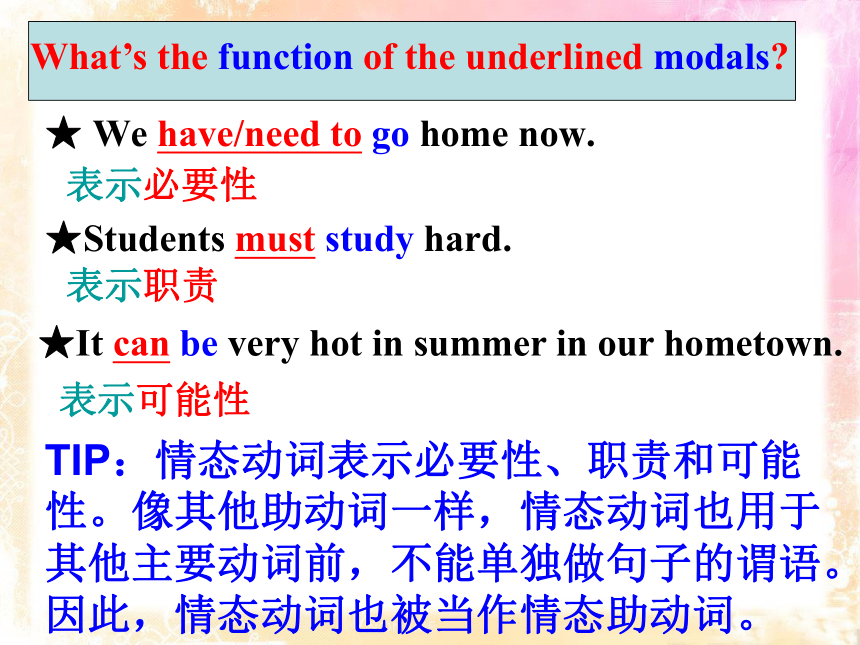Unit 3 The world online Grammar and usage(1)_ Auxiliary verbs课件(20张)
文档属性
| 名称 | Unit 3 The world online Grammar and usage(1)_ Auxiliary verbs课件(20张) |  | |
| 格式 | zip | ||
| 文件大小 | 620.2KB | ||
| 资源类型 | 教案 | ||
| 版本资源 | 牛津译林版 | ||
| 科目 | 英语 | ||
| 更新时间 | 2019-07-31 21:59:12 | ||
图片预览









文档简介
课件20张PPT。Unit 3 The world online Grammar Auxiliary verbs
★We are having an English class.
★ I have seen the film.
★ He didn’t go home last night.
★ We will fly for Africa next month.
帮助主要动词have构成现在进行时帮助主要动词see构成现在完成时帮助主要动词go构成一般过去时帮助主要动词fly构成一般将来时What’s the fun_ction of the underlined words?★ He was sent to England.
★I would fly to Sweden if I were a bird.
★Had I lived in London, I would have been to London Bridge.
What’s the fun_ction of the underlined words?帮助主要动词send构成被动语态帮助主要动词构成虚拟语气1 助动词和其他动词一起构成时态、语气和语态。可以用作助动词的有be、do、have和情态动词。帮助主要动词构成虚拟语气★ We have/need to go home now.
★Students must study hard.
What’s the fun_ction of the underlined modals?表示必要性表示职责TIP:情态动词表示必要性、职责和可能性。像其他助动词一样,情态动词也用于其他主要动词前,不能单独做句子的谓语。因此,情态动词也被当作情态助动词。★It can be very hot in summer in our hometown.表示可能性★Do you like college life?
★ Did you study English before you came here?
★ I do not like him.
★ Do call me tomorrow.
★He did know that.
What’s the fun_ction of “do/did”?构成疑问句
构成疑问句构成否定句
构成强调结构构成强调结构助动词还可用来构成否定或疑问句,以及强调结构。补充:do用作代动词,例如:
— Do you like Beijing?
你喜欢北京吗?
— Yes, I do.
是的,喜欢。(do用作代动词,代替like Beijing.)
练习1:请在划线处填入适当的助动词。
★1We _______ go to London first.
★2The modern Olympic Games _______held in 1896, in Athens.
★3 What ______ you do if you had a billion?
★4 Hope you won’t have to wait as long as we _________. Good luck.
★5As you can see, I ______escape.
★6 He has made great progress recently, and so _______you.
willwerewoulddiddidhave练习2:Translate the following sentences.
1.你打电话时,我正在洗澡。
2.孩子们被照顾得很好。
3.我学法语已经三年了
4.你去过长城吗?
I was having a bath when you called.The children are taken good care of.I have been studying French for three years.Have you been to the Great wall?
5.我不知道那本小说的名字。
6. 我确实认为你该去。
7.明年你要毕业了吗?
8.他告诉我们他要出国学习了。
9.下周我就要搬进新房子了。
I don't know the name of that novel.I do think you should go.Will you graduate next year?He told us that he would study abroad.I shall move to the new house next week.★I have to go to help her every Saturday. ★ You had better take an umbrella. 2.短语助动词由一个助动词和另一个或两个词组成.如:have (got) to, had better, would sooner/rather(…than), be to, be likely to, be supposed to, ought to, used to, be about to ,be able to, etc.★ I have (got) to clean the blackboard before the teacher comes.
★ I have (got) to go now; my wife will be waiting for me.
★ You didn't have to tell her the whole story.
●have (got) to 表示“得做某事”,或提出建议,其否定形式not have to意为“不必”。
★Many countries would rather be cautious with this new technology.
★I would sooner walk to work than take a bus.
●would rather/sooner(…than)的意思是“宁愿,更愿意”。
★ He is to go to New York next week.
★The president is to speak on TV tonight.
★You are to explain this. We can’t stand this kind of behaviour.
●be to表示未来的打算和安排,或用于正式的指示和命令。
说明:这种用法也可以说成是一种
将来时态表达法。补充:be + 动词不定式的其他用法
a.征求意见。如:
How am I to answer him?
我该怎样答复他?
b. 表示相约、商定。如:
We are to meet at the school gate at
seven tomorrow morning.
我们明天早晨7点在校门口集合。
★He is likely to win the first prize.
★That is not likely to happen.
●be likely的意思是某事有可能发生或可能是真的。★Teachers are supposed to treat all the students alike.
★ You are not supposed to smoke on the bus.
● be supposed to用来表示“被期望”或“应该”。其否定形式be not supposed to用来表示“不允许”。
补充:1)当be supposed to... 的主语是“物”时,它表示“本应;本该”,用于表示“某事本应该发生而没有发生”。
The train was supposed to arrive an hour ago.
2)be supposed to后面接“have + 过去分词”时,表示“本应该做某事而没做”。
You are supposed to have handed in your homework by now. ★I used to love cats until I was attacked by a big black cat last week.
★He didn’t use to smoke when he was young.
★Did he use to come as often as he does now?
●used to表示“过去一直”或“过去经常”。
Answers to A P411.have
2.haven’t
3.don’t
4.didn’t
5.was
6.did
7.did
8.didn’t
9.wouldn’t have
10.will
Answers to B P411.was about to
2.used to
3.wasn’t able to
4.was likely to
5.was supposed to
6.would rather
Do parts C1 and C2 on Page 118 of the workbook.
★We are having an English class.
★ I have seen the film.
★ He didn’t go home last night.
★ We will fly for Africa next month.
帮助主要动词have构成现在进行时帮助主要动词see构成现在完成时帮助主要动词go构成一般过去时帮助主要动词fly构成一般将来时What’s the fun_ction of the underlined words?★ He was sent to England.
★I would fly to Sweden if I were a bird.
★Had I lived in London, I would have been to London Bridge.
What’s the fun_ction of the underlined words?帮助主要动词send构成被动语态帮助主要动词构成虚拟语气1 助动词和其他动词一起构成时态、语气和语态。可以用作助动词的有be、do、have和情态动词。帮助主要动词构成虚拟语气★ We have/need to go home now.
★Students must study hard.
What’s the fun_ction of the underlined modals?表示必要性表示职责TIP:情态动词表示必要性、职责和可能性。像其他助动词一样,情态动词也用于其他主要动词前,不能单独做句子的谓语。因此,情态动词也被当作情态助动词。★It can be very hot in summer in our hometown.表示可能性★Do you like college life?
★ Did you study English before you came here?
★ I do not like him.
★ Do call me tomorrow.
★He did know that.
What’s the fun_ction of “do/did”?构成疑问句
构成疑问句构成否定句
构成强调结构构成强调结构助动词还可用来构成否定或疑问句,以及强调结构。补充:do用作代动词,例如:
— Do you like Beijing?
你喜欢北京吗?
— Yes, I do.
是的,喜欢。(do用作代动词,代替like Beijing.)
练习1:请在划线处填入适当的助动词。
★1We _______ go to London first.
★2The modern Olympic Games _______held in 1896, in Athens.
★3 What ______ you do if you had a billion?
★4 Hope you won’t have to wait as long as we _________. Good luck.
★5As you can see, I ______escape.
★6 He has made great progress recently, and so _______you.
willwerewoulddiddidhave练习2:Translate the following sentences.
1.你打电话时,我正在洗澡。
2.孩子们被照顾得很好。
3.我学法语已经三年了
4.你去过长城吗?
I was having a bath when you called.The children are taken good care of.I have been studying French for three years.Have you been to the Great wall?
5.我不知道那本小说的名字。
6. 我确实认为你该去。
7.明年你要毕业了吗?
8.他告诉我们他要出国学习了。
9.下周我就要搬进新房子了。
I don't know the name of that novel.I do think you should go.Will you graduate next year?He told us that he would study abroad.I shall move to the new house next week.★I have to go to help her every Saturday. ★ You had better take an umbrella. 2.短语助动词由一个助动词和另一个或两个词组成.如:have (got) to, had better, would sooner/rather(…than), be to, be likely to, be supposed to, ought to, used to, be about to ,be able to, etc.★ I have (got) to clean the blackboard before the teacher comes.
★ I have (got) to go now; my wife will be waiting for me.
★ You didn't have to tell her the whole story.
●have (got) to 表示“得做某事”,或提出建议,其否定形式not have to意为“不必”。
★Many countries would rather be cautious with this new technology.
★I would sooner walk to work than take a bus.
●would rather/sooner(…than)的意思是“宁愿,更愿意”。
★ He is to go to New York next week.
★The president is to speak on TV tonight.
★You are to explain this. We can’t stand this kind of behaviour.
●be to表示未来的打算和安排,或用于正式的指示和命令。
说明:这种用法也可以说成是一种
将来时态表达法。补充:be + 动词不定式的其他用法
a.征求意见。如:
How am I to answer him?
我该怎样答复他?
b. 表示相约、商定。如:
We are to meet at the school gate at
seven tomorrow morning.
我们明天早晨7点在校门口集合。
★He is likely to win the first prize.
★That is not likely to happen.
●be likely的意思是某事有可能发生或可能是真的。★Teachers are supposed to treat all the students alike.
★ You are not supposed to smoke on the bus.
● be supposed to用来表示“被期望”或“应该”。其否定形式be not supposed to用来表示“不允许”。
补充:1)当be supposed to... 的主语是“物”时,它表示“本应;本该”,用于表示“某事本应该发生而没有发生”。
The train was supposed to arrive an hour ago.
2)be supposed to后面接“have + 过去分词”时,表示“本应该做某事而没做”。
You are supposed to have handed in your homework by now. ★I used to love cats until I was attacked by a big black cat last week.
★He didn’t use to smoke when he was young.
★Did he use to come as often as he does now?
●used to表示“过去一直”或“过去经常”。
Answers to A P411.have
2.haven’t
3.don’t
4.didn’t
5.was
6.did
7.did
8.didn’t
9.wouldn’t have
10.will
Answers to B P411.was about to
2.used to
3.wasn’t able to
4.was likely to
5.was supposed to
6.would rather
Do parts C1 and C2 on Page 118 of the workbook.
